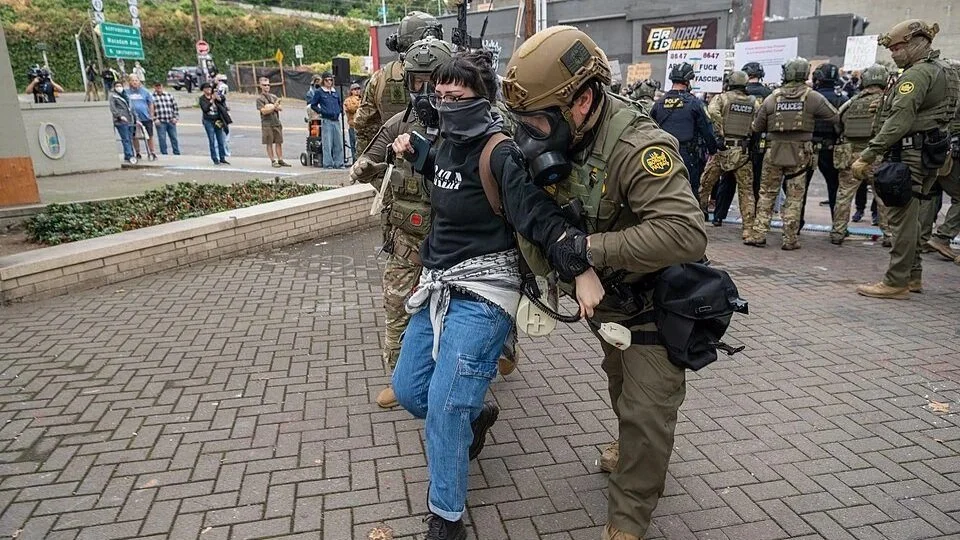Last week’s ICE raid in Madison was an appalling sideshow. There are real concerns and they remain unaddressed
This Tuesday, federal immigration agents conducted a raid at two manufacturing plants in Madison. Eight workers were arrested, welders and fabricators, most of them from Central America. These individuals were not armed criminals or gang members. They were employees, showing up for work like they do every day.
It happened just a few days after Kristi Noem visited Madison to deliver a commencement address at Dakota State University. That visit was met with protests calling out her immigration stance, including her push to deport a South Dakota college student. Then came the raid. The message felt deliberate.
The political utility of the operation is hard to ignore. It made headlines. It created a spectacle. But it did little to serve justice, public safety, or South Dakota communities.
ICE has grown into a massive enforcement bureaucracy with a budget approaching $10 billion a year. Yet the vast majority of its work involves detaining people who pose no actual threat. Most ICE arrests are for civil immigration violations or nonviolent infractions. And it’s not cheap. The cost per deportation routinely exceeds $10,000.
Taxpayers are footing the bill for a dragnet that targets workers and families while drug traffickers, child predators, and fraudsters often operate in the background with far less attention.
That disconnect is on full display in Madison. At least one of the companies raided had previously received state economic development incentives. During Kristi Noem’s time as governor, her administration actively courted these businesses. The state gave them funding. The federal government gave them workers.
And now, the same politicians turn around and criminalize the labor force they made possible, without penalizing the businesses that employed them.
It’s an absolute systemic failure.
South Dakota faces real public safety challenges. Meth continues to devastate families across the state. Human trafficking is on the rise. Domestic abuse and child exploitation cases are often underreported and under-prosecuted. These are not abstract issues. They are happening in our neighborhoods, in small towns and rural communities.
ICE does not address these problems. It was never designed to. Yet elected officials like Kristi Noem continue to elevate ICE as a symbol of law and order while downplaying the local systems that actually keep communities safe.
There’s also a serious question of priorities. Gov. Noem sent South Dakota National Guard troops to the southern border multiple times during her tenure. One of those deployments was privately funded by a GOP megadonor. Others were paid for by the state.
But when parts of South Dakota experienced severe flooding, she declined to mobilize the Guard, citing costs. That contradiction should raise concern for anyone who values fiscal responsibility and responsive governance.
In the name of border politics, local resources are being redirected, constitutional rights are being strained, and working-class families are being uprooted. Meanwhile, the people and institutions who profit from all of it remain untouched.
This is not what conservatism looks like.
Real conservative leadership is about accountability, prudence, and protecting the dignity of working people. It means using public dollars wisely. It means focusing enforcement on real threats. It means building systems of safety and justice, not stage-managing arrests for campaign talking points.
The raid in Madison was not a moment of strength. It was a reminder of how far our politics have drifted from principle.
Anyone who still believes in conservative values (limited government, fiscal restraint, local control, public order rooted in fairness) should be willing to speak up.
South Dakota can do better than this. And it must.
Jordan Deffenbaugh is a community builder, educator, and creative strategist based in Sioux Falls where he aids in community projects with the BAM Institute of Civic Biodesign and facilitates one of the most active Strong Towns conversations in the country. With a background in theater, digital marketing, and somatic practices, he blends storytelling, systems thinking, and grassroots action to design resilient, community-led solutions. He ran for a seat on the Sioux Falls City Council in 2024, advancing to a runoff.
Photo: ICE raid at an unidentified location, public domain, wikimedia commons
The South Dakota Standard is offered freely and is supported by our readers. We have no political or commercial sponsorship. If you'd like to help us continue our mission to advance independent political and social commentary, you can do so by clicking on the "Donate" button that's on the sidebar to your right.







